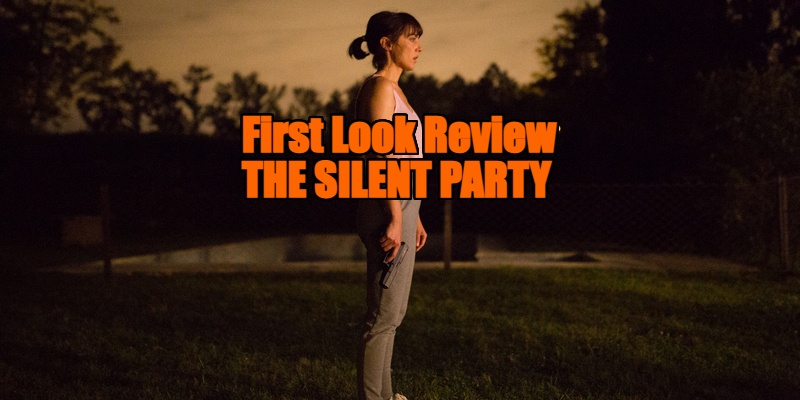
Review by
Eric Hillis
Directed by: Federico Finkielstain, Diego Fried
Starring: Jazmín Stuart, Gerardo Romano, Esteban Bigliardi, Lautaro Bettoni, Gaston
Cocchiarale

That most problematic of sub-genres, the rape-revenge thriller, has seen an
unlikely revival in recent years as women filmmakers have stamped their POV
on a type of movie traditionally made by and, let's face it, for men. Films
like
Violation,
Revenge
and
Rose Plays Julie
have all adopted the traditional rape-revenge format, but added clever
subversions to the genre.
Initially it seems directors Federico Finkielstain and
Diego Fried are set to do something similar with their Argentine
thriller The Silent Party. For much of the running time it appears we're in for something along the
lines of Michael Haneke's Funny Games, with the filmmakers causing us to question the bloodlust that fuels our
desire for revenge narratives. Madeleine Sims-Fewer and Dusty
Mancinelli recently did likewise with Violation, a movie that made it clear that revenge only adds to a victim's scars.
But The Silent Party ultimately reverts disappointingly to
type with a final act that falls into genre cliches.

The setting is the sprawling estate of Leon (Gerardo Romano), who is
set to see his thirtysomething daughter Laura (Jazmín Stuart)
wed her fiancé Daniel (Esteban Bigliardi). It's clear that the
assertive Laura takes after her father, and perhaps has inherited a degree
of entitlement. Daniel on the other hand is a timid type, and the pair seem
an unlikely match. When Laura attempts to initiate sex, Daniel refuses,
causing her to storm off in a huff. It's an interesting touch, given we know
what's coming later in the film, as it dares to show that it's not just men
who can feel entitled to sex.
Strolling through the fields around her family's estate, Laura comes upon a
"silent party" being held at a neighboring home. You know, one of those
bizarre parties where everyone listens to the music through headphones
rather than speakers. I've never understood the point of this - aren't
parties supposed to be communal events? - but it makes for an interesting
visual backdrop as Laura wanders through a group of millennials dancing to
music neither she nor the viewer can hear.

One of the young partygoers, the handsome Gabriel (Lautaro Bettoni),
makes moves on Laura, who gladly reciprocates, fuelled by a mix of alcohol,
resentment for her future hubby and general horniness. In what plays like a
nod to Straw Dogs, the consensual coupling between Laura and Gabriel turns into a
non-consensual assault when the latter's friend Maxi (Gastón Cocchiarale) decides to join in.
If you've seen enough of these movies, you expect Laura to pull herself
together and take violent revenge. It seems that's what we're in for when
she heads home and takes one of her father's pistols, returning to the scene
of the crime. Things take a twist when Leon and Daniel learn what occurred
and decide to intervene. Leon wants to make those who attacked his little
girl pay, while Daniel wants to leave it to the authorities to handle. When
Daniel sees a video of Laura seemingly enjoying the company of Gabriel, he
begins to doubt Laura's account, but he's overpowered by the forceful Leon
and dragged along for an encounter that likely won't end well for all
concerned.

It seems at this point that Finkielstain and Fried are giving us
something different. Seeing the hot-headed Leon display more concern towards
taking revenge than to the well-being of his daughter (neither he nor Daniel
ever think that maybe they should take her to a hospital), as an audience
we're no longer sure if we wish to see a traditional revenge narrative play
out. It's clear that Leon's actions are only going to make things worse, and
Laura initially seems to adopt this way of thinking herself. But what seems
like something novel in this sub-genre - a female victim trying to stop her
male relatives from taking revenge in her name - is soon dismissed as the
final act sees things flip back around to the traditional idea of the victim
enacting vengeance.
As it plays out to an obvious conclusion,
The Silent Party wastes its early interrogation of the nature
of revenge and begins to resemble a dozen other films of its type. There's
much wandering through dimly lit woods, and the movie seems confused as to
whose viewpoint it wants to present as it focusses heavily on Maxi's
attempts to escape his fate. By the time it all wraps up with a beat lifted
straight out of the Scream franchise, we find ourselves
bemoaning a missed opportunity to further interrogate cinema's most
disreputable sub-genre.

The Silent Party is on US VOD from
July 12th. A UK/ROI release has yet to be announced.

